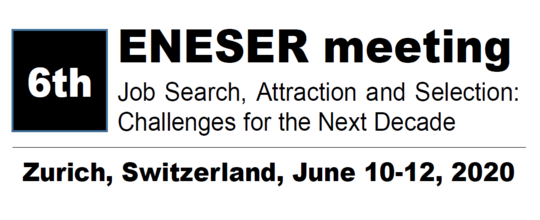EAWOP Small Group Meeting Job Search, Attraction, and Selection: Challenges for the Next Decade Call for Papers
05.12.2019

EAWOP Small Group Meeting
Job Search, Attraction, and Selection:
Challenges for the Next Decade
Call for Papers
June 10-12, 2020
University of Zurich, Switzerland
Organizers: Annika Wilhelmy and Martin Kleinmann
Conference Theme and Scope
The world of work is changing rapidly due to the availability of big data, the development of artificial intelligence, population migration and demographic changes, and yet these changes and their consequences for individuals, organizations, and society are poorly understood. The developments in the world of work also affect how individuals search for jobs, what kind of jobs they feel attracted to, and how they are selected for jobs. Job search, recruitment and selection have been cornerstones of work and organizational psychology for the last 100 years. Vibrant research in these fields has led to countless meta-analyses and literature reviews aiming to drive theoretical developments and best practice approaches to evidence-based management in job search, recruitment, and selection. Despite these efforts, however, it has recently been acknowledged that the fields of job search, recruitment and selection still face just as many (if not more) challenges as one hundred years ago. This is due to various reasons, among which the availability of big data, the development of artificial intelligence, population migration and demographic changes are likely key factors. The aim of the 6th small group meeting (SGM) of the European Network of Selection Researchers (ENESER) is twofold: 1) to advance our empirical
and conceptual knowledge of recent developments in recruitment and selection and 2) to bridge scientist-practitioners gaps in new job search, recruitment, and selection practices. Specifically, this SGM aims to explore a number of recent developments in these areas, including:
1. Research on job search strategies for different groups (e.g. migrants) and their effects in changing work environments.
2. Research on artificial intelligence and big data in personnel selection and recruitment.
3. Research on predictors of task, contextual, adaptive, and counterproductive behaviorsincluding boundary conditions of these effects.
4. Research on applicant reactions, ability to identify criteria, impression management tactics, and applicant faking behavior.
5. Research on biases in selection and how these biases affect subsequent decision maker behavior and selection outcomes.
6. Research on applicant expectations and perceptions of traditional versus technologybased assessment, recruitment, and selection procedures.
7. Research on interviewers’ perception on the role of technology in job search, recruitment, and selection.
8. Research on applicant job search behaviors, attraction to organizations, job choice, and intentions to accept job offers.
9. Research on applicant withdrawal behaviors at various stages of the recruitment and selection process.
10. Research on ethnic, gender, and age differences in assessment of task, contextual, and counterproductive behaviors and their effects on recruitment and selection outcomes.
Format of the meeting
The meeting will start on June 10, 2020 with a reception in the late afternoon. On June 11 and 12, we will have two full days of presentations and discussions of approximately 25 papers. This format will allow participants to have ample discussions about their research. There will also be a lot of opportunities for networking and building collaborative project ideas. The event will end at the latest by 6pm on June 12. Additionally, after the official end of the meeting, a public viewing event for the opening match of the European Football Championship can be attended on a voluntary basis.
Location
The conference will be held in Zurich, Switzerland. Zurich has a unique position in Switzerland. It is the country's largest city and home to an internationally reputed financial center as well as the focus of an economic region which acts as the motor of Switzerland. The wide variety of cultural activities and educational institutions define Zurich's character as a diverse, open city with a passion for life. It is famous for its lakeside location and green, densely wooded chain of hills which run through the city from north to south with views to the Alps. The high standards of living, working, and accommodation are regularly confirmed in surveys of the local residents, and Zurich consistently finds itself at the top of international rankings of cities in terms of quality of life. By the way, Zurich is also the home of the FIFA World football museum. The Small Group Meeting will take place at the University of Zurich. Its central location is ideal for different accommodation, dining and entertainment options.
Conference fees
The conference fee is 120 CHF and 60 CHF for PhD students (please provide a copy of your student ID), which includes lunches, coffee/tea, a conference dinner, and drinks at the welcome reception. Travel and accommodation costs have to be covered by participants.
Submission of abstracts
Participants are invited to submit paper abstracts (up to 1000 words excluding references; max. two additional pages of tables and figures) by January 15, 2020 to Annika Wilhelmy (a.wilhelmy@psychologie.uzh.ch). Submissions should be structured as follows:
purpose/contribution, design/methodology, results, limitations, implications, and originality/value. In the abstract, the authors should also indicate how their paper fits the scope of the SGM. Submitted abstracts will be pre-screened and selected following a blind peer-review procedure. Participants will be notified about the acceptance of their paper by March 15, 2020. Upon the abstract acceptance, all participants should pay the participation fee by March 30, 2020.
Dissemination activities
The SGM plans to yield a product available free of charge to the EAWOP members. Therefore, the organizers plan to submit a position paper for publication in EJWOP. In addition, there may be a special issue, for example in the International Journal of Selection and Assessment, which will be further discussed at the ENESER meeting.

